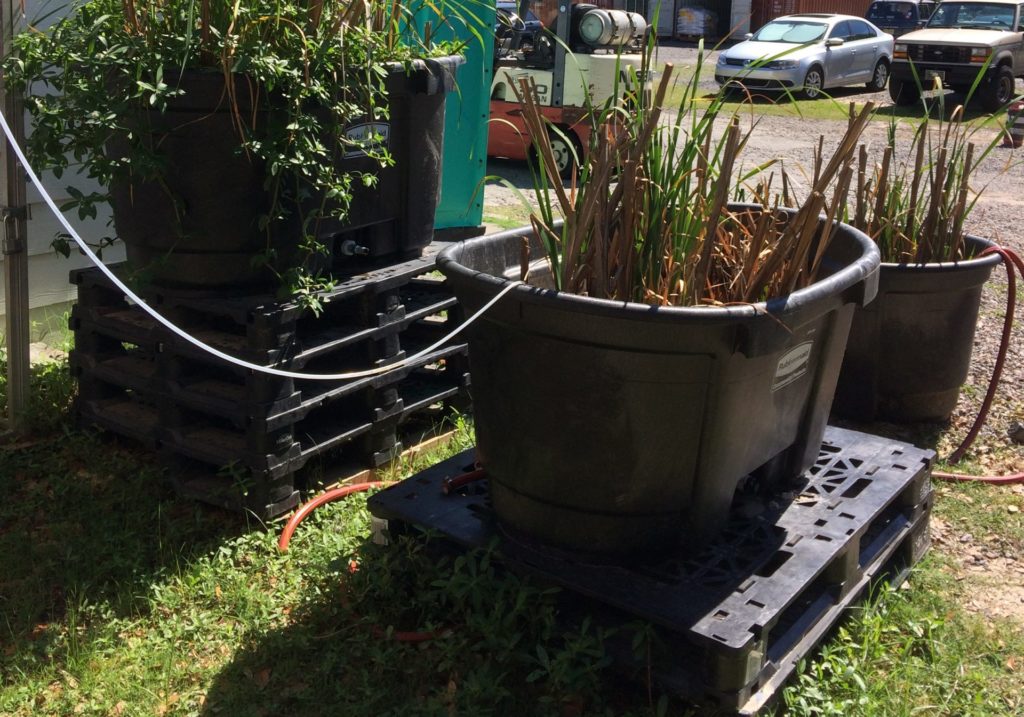SynTerra and Charleston brewery test constructed wetland technology
By Kevin Campbell (Posted June 26, 2018):

SynTerra is conducting microcosm-scale testing at Holy City Brewing. Results support the viability of using a constructed wetland to treat brewery wastewater.
While enjoying a beer, you probably don’t ponder what happens to wastewater from the beer-making process. Nevertheless, brewing beer creates about eight times as much wastewater as it does beer. Processing wastewater poses necessary, and often costly, tasks for breweries. For some brewers, like Holy City Brewing of Charleston, SC, environmental concerns also figure prominently in their business objectives.
Recognizing that a constructed wetland might be the solution, Holy City Brewing partnered with SynTerra and the College of Charleston. SynTerra responded with an innovative project that includes pilot testing of a microcosm-scale constructed wetland at the microbrewery. The testing so far has supported the viability of using a constructed wetland to treat brewery wastewater.
A constructed wetland has the potential to reduce biochemical oxygen demand (BOD) and levels of total suspended solids (TSS) in Holy City Brewery’s wastewater before it reaches the North Charleston Sewer District (NCSD) sewer line. SynTerra believes that this technology will be well-received by all stakeholders: environmental agencies, Holy City Brewing, and the general public.
Constructed wetlands have been used for decades to successfully treat various industrial and municipal wastewaters. Wetlands generally consist of shallow basins through which water flows and contacts wetland flora, soil, and microorganisms. By controlling water flow and using appropriate plants and soils, natural processes are enhanced to efficiently clean the wastewater.
Constructed wetlands have a proven track record for addressing BOD, solids, and pH levels in wastewater from operations like breweries. Constructed wetlands typically produce no additional waste streams, are robust, are easy to construct, and seldom require chemicals. In addition to being less expensive to operate and maintain than traditional wastewater treatment systems, constructed wetlands are an environmentally sustainable treatment method that can be an attractive focal point for a brewery wanting to showcase green technology.
The SynTerra pilot constructed wetland study included 12 monitoring cycles comparing inflow water with outflow water. SynTerra began monitoring on March 6, 2017, and concluded May 12, 2017. Parameters monitored were five-day BOD, total suspended solids (TSS), turbidity, and pH. At the beginning and end of the study, oil and grease, ammonia, nitrate/nitrite, and phosphorous were also measured.
Results indicated that TSS decreased by approximately 80 percent between wetland inflow and outflow, average pH increased to 5 from about 3.7 and stabilized, and BOD levels did not significantly decrease. Because BOD removal by the wetlands was not consistently observed, pre-treatment by mechanical means may be needed. SynTerra is investigating pre-treatment options for BOD.
The conceptual wastewater treatment design using constructed wetlands described below will improve wastewater quality by decreasing TSS and stabilizing pH. If BOD treatment is incorporated, the constructed wetlands will provide “polishing” treatment before discharge to the public sewer or, eventually, the creek.
The next step in evaluation of constructed wetlands is to pilot test additional primary treatment that would occur before wastewater reaches the constructed wetland. Factors to be evaluated are:
- Use of EQ tank of significant volume (pH and flow controlled)
- Use of primary treatment (reduction of filterable solids and BOD)
- Evaluation of polish wetland (below-grade wetland, surface-flow wetland)
SynTerra has communicated with several breweries throughout the Southeast about this technology and is identifying a partner craft brewer for phase two pilot testing. That pilot study will include improvements identified from the pilot study at Holy City Brewing. Additionally, it will provide data required for full scale implementation at an innovative and ecologically-minded microbrewery.





